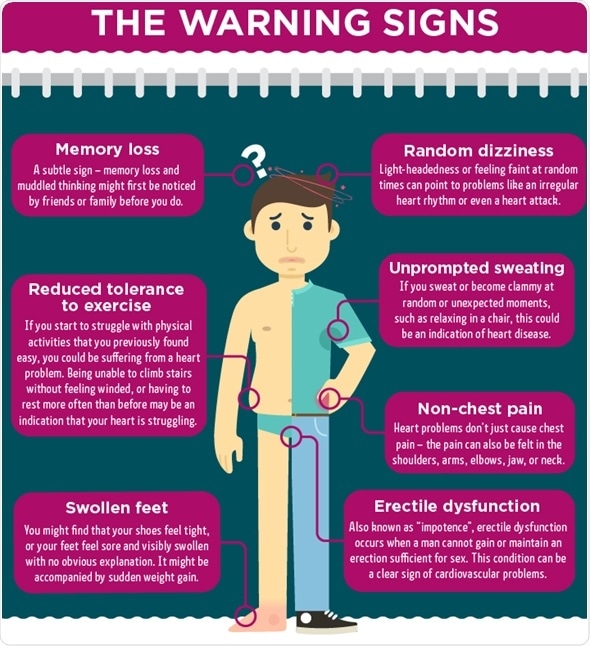- Posted on
- Royal Papworth
- No Comments
Since 1 in 4 deaths in the UK are related to a heart or circulatory disease, addressing heart health is a concern of national importance. Heart disease is the leading cause of death in men over 50, and an estimated 7 million of us are living with an undiagnosed risk factor – high blood pressure.
Put simply, everybody should know the state of their heart. The sudden onset of pain in the chest or down the arm is the most obvious sign of a heart problem, but many people are unaware that there are other signs you can watch out for.
See your GP as soon as possible after spotting any of these problems. They may need to run tests to work out the cause of your symptoms.
However, don’t be too alarmed – many of these symptoms can be easily explained and may not be linked to your heart’s health. Some of these symptoms, such as erectile dysfunction, can also be treated in the short term until you work to improve your cardiovascular health.
As a long-term action, consider changing certain behaviours to lower your risk of developing a heart problem – I have listed some advice below.

How to reduce your risk of heart problems
Crucially, we do have the power to lower our risk of heart disease. Making a few adjustments to your lifestyle could do wonders for your heart, and reduce important risk factors like high blood pressure, high levels of LDL cholesterol, and obesity.
Exercise is a great way of protecting yourself against heart disease. It works to lower your blood pressure, improve circulation and increase your heart’s strength. Try to get some cardiovascular exercise, such as jogging, swimming, or cycling, 3-5 times each week.
Maintaining a healthy, balanced diet is also essential to good heart health. In particular, reducing the consumption of foods high in saturated fats and sugars will help lower the level of ‘bad’ cholesterol in your blood and will protect you against developing type 2 diabetes. Reducing your intake of salty foods will also help protect against high blood pressure, which is a key risk factor for heart disease.
It’s also important to control the size of your portions. Continually taking in more energy than you expend can lead to weight gain, which puts extra pressure on your heart. Visceral fat in particular, which collects around your waistline, increases your chances of developing heart disease. You may want to reduce your portion sizes as a result to try and lose some weight.

